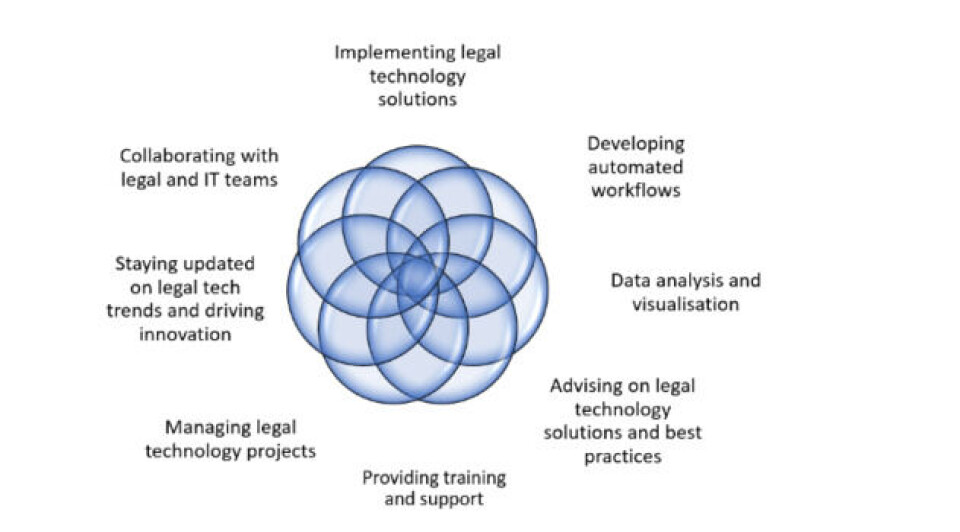Legal technologists are essentially multifaceted catalysts for change who seamlessly blend legal expertise with technological acumen. These professionals serve as linchpins, advising both clients and lawyers on the most effective utilisation of legal technology to enhance their legal operations.
For lawyers, they offer invaluable insights into the latest legal technology solutions, empowering them to seamlessly integrate tools like AI-powered contract review platforms, data analytics for informed decisions, and collaborative platforms for enhanced teamwork, ultimately boosting efficiency in handling complex cases.
Clients benefit from their expertise in navigating the vast array of legal technology options. When they understand the specific legal needs and business objectives of each client, legal technologists can recommend and implement tailored tools, guiding their clients through the "tech maze" and ensuring they leverage the most suitable solutions for tasks like contract management and eDiscovery.
A legal technologist's responsibilities may vary depending on the specific role, organisation and industry, but adding them to your team unlocks a wealth of advantages. Firstly, they streamline processes and automate repetitive tasks, freeing up valuable time for lawyers to perform high-value work. This boosts individual efficiency and enhances overall team productivity. Secondly, legal technologists leverage data-driven insights to support informed decision making. They also help mitigate risks and ensure compliance by implementing tailored technology solutions, strengthening the organisation’s risk management framework. Finally, these specialists foster a culture of innovation by continuously exploring new technologies and methodologies to optimise legal processes and ultimately deliver greater value to clients.
So, what makes a “good” legal technologist? Typically they will possess a combination of key traits and skills that enable them to effectively navigate the intersection of law and technology. These are some of the characteristics they may display:
-
Legal background: Legal technologists with legal backgrounds are better able to understand the needs and challenges of legal professionals and clients.
-
Curiosity and innovation: Good legal technologists are naturally curious individuals who are constantly seeking better ways of working.
-
Stakeholder awareness and collaboration: Legal technologists recognise that legal technology initiatives impact various stakeholders and divisions within an organisation, including legal, information technology, data governance and security, and the project management office. They understand the importance of collaboration and communication with these stakeholders to ensure the successful implementation and adoption of technology solutions.
-
Problem-solving skills: Effective legal technologists are adept problem solvers who can identify pain points and inefficiencies within legal processes and develop innovative solutions to address them.
-
Technical proficiency: While legal technologists may not need to be software developers, they should possess a strong understanding of technology and be comfortable working with software and digital tools.
-
Communication skills: Good legal technologists excel in communication, both verbal and written. They can effectively articulate complex technical concepts to non-technical stakeholders, including legal professionals and clients.
-
Adaptability: The legal technology landscape is constantly evolving, with new tools and methodologies emerging regularly. Good legal technologists are adaptable and embrace change, continuously learning and evolving their skills to stay ahead of industry trends and advancements.
-
Ethical awareness: Given the sensitive nature of legal information and the potential implications of technology on legal processes, good legal technologists possess a strong ethical awareness. They understand the importance of data privacy, confidentiality and compliance with regulatory requirements, and prioritise these considerations in their work.
As technology continues to evolve, the role of legal technologists will become increasingly vital. By embracing innovation and fostering collaboration, legal teams can harness the full potential of legal technology to drive efficiency and deliver exceptional client experiences. Integrating legal technologists into organisations represents a strategic move towards lasting transformation, because these experts bridge the gap between cutting-edge technology and real-world legal practice, shaping the future of the industry. With their expertise and guidance, organisations can confidently navigate the complexities of modern legal technology, reaching new heights of success.
To join Africa Legal's mailing list please click here

